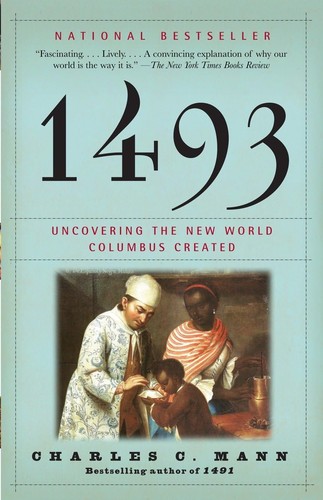Check nearby libraries
Buy this book

"From the author of 1491--the best-selling study of the pre-Columbian Americas--a deeply engaging new history that explores the most momentous biological event since the death of the dinosaurs. More than 200 million years ago, geological forces split apart the continents. Isolated from each other, the two halves of the world developed totally different suites of plants and animals. Columbus's voyages brought them back together--and marked the beginning of an extraordinary exchange of flora and fauna between Eurasia and the Americas. As Charles Mann shows, this global ecological tumult--the "Columbian Exchange"--underlies much of subsequent human history. Presenting the latest generation of research by scientists, Mann shows how the creation of this worldwide network of exchange fostered the rise of Europe, devastated imperial China, convulsed Africa, and for two centuries made Manila and Mexico City-- where Asia, Europe, and the new frontier of the Americas dynamically interacted--the center of the world. In 1493, Charles Mann gives us an eye-opening scientific interpretation of our past, unequaled in its authority and fascination"--
Check nearby libraries
Buy this book

Previews available in: Chinese English
Subjects
New York Times bestseller, Economic history, Commerce, History, Ecology, Slave trade, Industrial revolution, Environmental aspects, Modern History, Influence, Agriculture, HISTORY / Americas (North, Central, South, West Indies), HISTORY / Expeditions & Discoveries, Discovery and exploration, Economic aspects, HISTORY / United States / Colonial Period (1600-1775), nyt:hardcover_political_books=2011-10-29, nyt:paperback-nonfiction=2012-08-12, Columbus, christopher, 1451-1506, History, modern, Commerce, history, Agriculture, history, America, discovery and exploration, Shi jie shi, Tong su du wu, Sheng wu di li xue, Ying xiang, Zhong shi ji shiPeople
Christopher ColumbusPlaces
AmericaShowing 4 featured editions. View all 13 editions?
| Edition | Availability |
|---|---|
|
1
1493:wu zhong da jiao huan kai chuang de shi jie shi =: 1493: uncovering the new world Columbus created
2016, Zhong xin chu ban ji tuan gu fen you xian gong si
in Chinese
- Di 1 ban.
7508662555 9787508662558
|
eeee
|
|
2
1493: uncovering the new world Columbus created
2012, Vintage Books
in English
- 1st Vintage Books ed.
0307278247 9780307278241
|
aaaa
|
|
3
1493: How Europe's Discovery of the Americas Revolutionized Trade, Ecology and Life on Earth
2012, Granta Books
in English
1847082459 9781847082459
|
eeee
|
|
4
1493: uncovering the new world Columbus created
2011, Knopf
Hardcover
in English
0307265722 9780307265722
|
eeee
|
Book Details
Edition Notes
Includes bibliographical references and index.
Classifications
The Physical Object
Edition Identifiers
Work Identifiers
Source records
Library of Congress MARC recordInternet Archive item record
Library of Congress MARC record
Better World Books record
Work Description
From the author of 1491 -- the best-selling study of the pre-Columbian Americas -- a deeply engaging new history of the most momentous biological event since the death of the dinosaurs.
More than 200 million years ago, geological forces split apart the continents. Isolated from each other, the two halves of the world developed radically different suites of plants and animals. When Christopher Columbus set foot in the Americas, he ended that separation at a stroke. Driven by the economic goal of establishing trade with China, he accidentally set off an ecological convulsion as European vessels carried thousands of species to new homes across the oceans.
The Columbian Exchange, as researchers call it, is the reason there are tomatoes in Italy, oranges in Florida, chocolates in Switzerland, and chili peppers in Thailand. More important, creatures the colonists knew nothing about hitched along for the ride. Earthworms, mosquitoes, and cockroaches; honeybees, dandelions, and African grasses; bacteria, fungi, and viruses; rats of every description -- all of them rushed like eager tourists into lands that had never seen their like before, changing lives and landscapes across the planet.
Eight decades after Columbus, a Spaniard named Legazpi succeeded where Columbus had failed. He sailed west to establish continual trade with China, then the richest, most powerful country in the world. In Manila, a city Legazpi founded, silver from the Americas, mined by African and Indian slaves, was sold to Asians in return for silk for Europeans. It was the first time that goods and people from every corner of the globe were connected in a single worldwide exchange. Much as Columbus created a new world biologically, Legazpi and the Spanish empire he served created a new world economically.
As Charles C. Mann shows, the Columbian Exchange underlies much of subsequent human history. Presenting the latest research by ecologists, anthropologists, archaeologists, and historians, Mann shows how the creation of this worldwide network of ecological and economic exchange fostered the rise of Europe, devastated imperial China, convulsed Africa, and for two centuries made Mexico City -- where Asia, Europe, and the new frontier of the Americas dynamically interacted -- the center of the world.
In such encounters, he uncovers the germ of today's fiercest political disputes, from immigration to trade policy to culture wars. In 1493, Charles Mann gives us an eye-opening scientific interpretation of our past, unequaled in its authority and fascination.
Community Reviews (0)
| February 16, 2024 | Edited by Jürgen Hubert777 | Edited without comment. |
| January 6, 2024 | Edited by | Merge works |
| July 31, 2023 | Edited by | Merge works |
| March 2, 2020 | Edited by MARC Bot | remove fake subjects |
| August 26, 2011 | Edited by 158.158.240.230 | Edited without comment. |
















